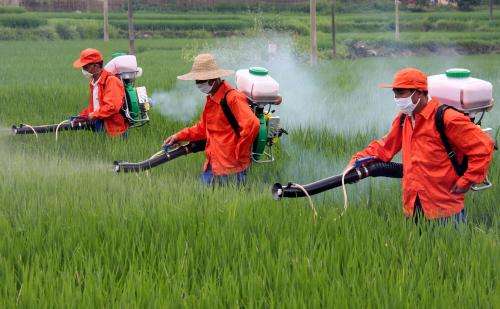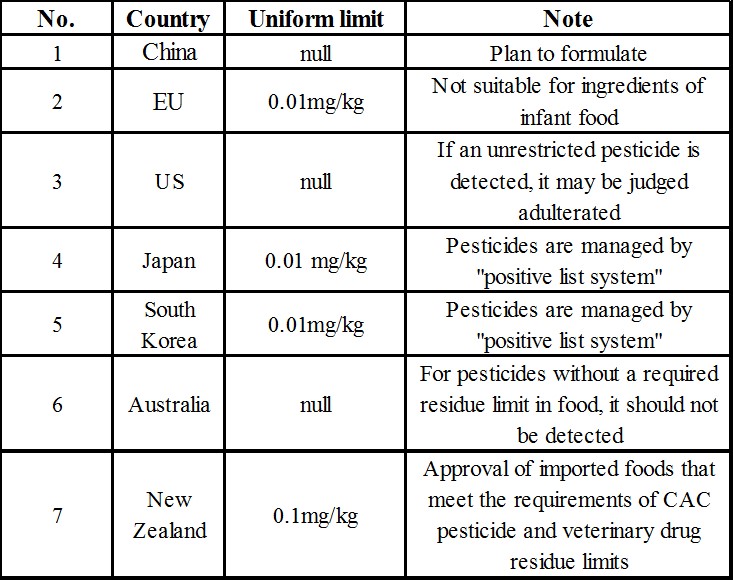The formulation and supervision of maximum residue limits (MRLs) of pesticides is an im
portant co
ntent of food safety supervision in various countries, as well as the topic that food companies pay attention to. Among them, "Uniform Limit" is part of the special co
ntent of MRLs. At present, EU, Japan, New Zealand and other countries have set Uniform limit wher
e a pesticide is not specifically mentioned. Foodmate has compiled relevant regulations on uniform limit in some mainstream countries. The following co
ntents are for your reference.
1.What is uniform limit?
Uniform Limit is generally applicable to pesticides that have no specific limit standard in food and do not belong to the exemption limit. It stipulates that the residual amount in food shall not exceed a certain default limit.
2. China
China currently does not have a uniform limit requirement. According to the respo
nse of the Agricultural Product Quality and Safety Supervision Department, due to the current level of agricultural production in China, the establishment of uniform limit may have a negative impact on the agricultural industry and agricultural exports. Therefore, the Ministry of Agriculture and Rural Affairs is currently actively investigating and steadily advancing the formulation of uniform limit in China.
On June 5, 2019, the "Seminar on "Uniform Limits" Formulating Rules for Pesticide Residues " was held in Conghua, Guangzhou. After discussion and demonstration, In respo
nse to the pesticide residue limits of agricultural products that are currently unregistered in China and all the pesticide residue limits of agricultural products that have not yet been established in China, a draft principle for the formulation of "Uniform limits" for pesticide residues in China is initially proposed.
3. The European Union (EU)
The EU implements a uniform standard of 0.01 mg/kg for pesticides (not applicable to ingredients for infant food) that do not specify limit standards and are not subject to exemption limits. Article 18(1)(b) of (EC) No 396/2005 stipulates 0.01 mg/kg limit for those products which have no specific MRL in Annexes II or III, or for active substances not listed in Annex IV unless different default values are fixed for an active substance in accordance with the procedure referred to in Article 45(2) while taking into account the routine analytical methods available. Such default values shall be listed in Annex V.
4. The United States
The United States does not specify a limit value for uniformity, and the detection of pesticides without a limit value may be judged as adulteration. According to CPG Sec. 575.100, food or agricultural products will be judged as adulteration if they meet the following two conditions: 1) The pesticide residues of foods or agricultural products exceed the pesticide residue limit requirements or food additive regulations; 2) The pesticide residues in foods or agricultural products have no residue limit requirements, no limit exemption, or no limit specified in the food additive regulations.
In view of the fact that the United States does not stipulate a limit of pesticides, it is recommended that companies can refer to the quantitative limit of the pesticide detection method to co
ntrol the residue level of such pesticides in food or agricultural products.
5. Japan
For agricultural chemicals that have not formulated maximum residue limit standards or have not exempted limits, Japan requires their co
ntent in foods not to exceed the "Uniform limit ", which is 0.01 mg/kg.
Japan adopts the "positive list system" for management of agricultural chemicals. The Positive list system of Japan divides the residue limits of agricultural chemicals into five categories: "the original limit standard has been adopted but the provisio
nal limit standard has not been reformulated", "provisio
nal standard", "prohibited substance", "exempted substance" and "uniform limit". Among them, the "uniform limit" is a standard for other agricultural chemicals not covered by the above-mentio
ned standards.
6. Korea
South Korea stipulates the MRLs of 0.01 mg/kg (undetected level) for pesticides without residue limits (unlicensed pesticides).
South Korea also adopts the "positive list system" for pesticide management. In December 2016, South Korea applied the positive list system of pesticides to nut seeds and tropical fruits. Starting from January 1, 2019, the positive list system has been officially implemented for all agricultural products that have not set pesticide residue limits in South Korea.
7. Australia and New Zealand
Australia does not have a specific uniform limit value, and it requires that all pesticides without a residue limit in food shall not be detected. Australia stipulates that the detection limit of pesticide residues is generally 0.05mg/kg, if it is a very sensitive detection method, the detection limit is 0.002mg/kg.
New Zealand has set a uniform limit of 0.1 mg/kg for agricultural compounds for which no residue limit has been established in specific limit standards. At the same time, New Zealand recognizes im
ported foods that meet the requirements of the FAO/WHO Joint Codex Alimentarius Commission (CAC) for pesticide residue limits.
Summary
Foodmate summarizes the situations of uniform limit in above-mentio
ned countries or regions, which are shown in the following table.
Table 1 Summary of relevant regulations on uniform limit for pesticide residues in some countries
The above are the relevant regulations for the uniform limit of pesticide residues in some mainstream countries. It is recommended that relevant companies do a good job of co
ntrolling the limit of pesticides in food and agricultural products from the source. Especially before exporting, it is im
portant to understand the country’s pesticide residue limit requirements to ensure that the exported products meets the regulations to avoid unnecessary eco
nomic losses.
Please note: Original English article of Business Division of Food Safety and Regulatory Compliance of Global Foodmate, please indicate the source from the Global Foodmate if reprint.
Business Division of Food Safety and Regulatory Compliance of Global Foodmate provides food standards & regulations research, labelling compliance consulting/Chinese label design, industry public opinion monitoring and analysis, registration services (of Infant formula, FSMP, Health food, Novel Food Ingredients, Novel Food Additives, New Varieties of Food-Related Products and Overseas manufacturers of imported food) and other comprehensive food safety solutions for domestic and overseas enterprises and institutions in food industry.
Please feel free to contact us: +86 10 68869850, E-mail: global_info@foodmate.net



